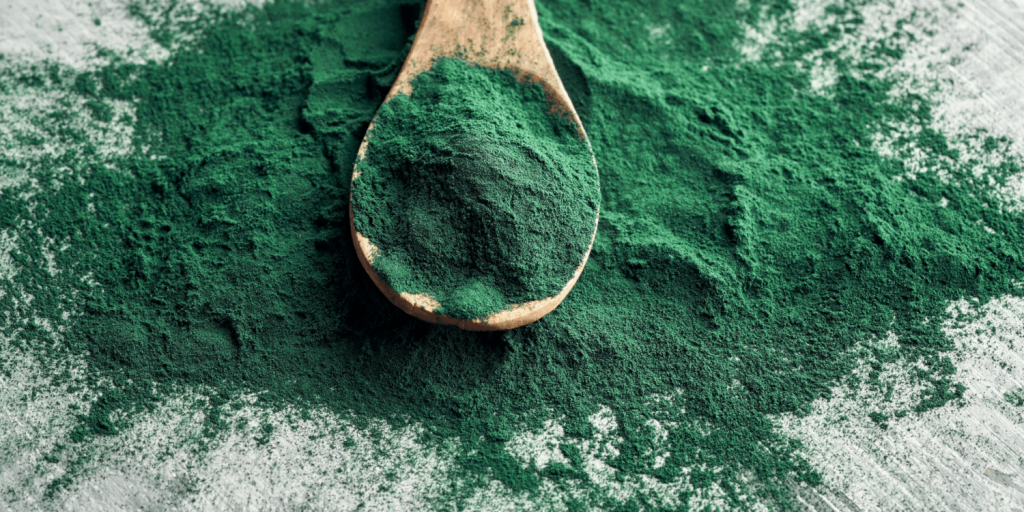Spirulina, properties and uses

Spirulina is a type of blue-green algae. It is a rich source of protein, as well as vitamin B1, B2, iron and copper. Due to its properties, it is classified as a superfood and is recommended for use in the daily diet.
Spirulina – what is it?
Spirulina is a type of cyanobacteria, living in both fresh and salt waters, often also referred to as blue-green algae. Spirulina derives its green colour from chlorophyll, and its blue colour from a pigment called phycocyanin.
Spirulina – nutritional value
The table below shows the nutritional value of spirulina in dry, powdered form.
| Name | Quantity |
| Energy | 290 kcal |
| Protein | 57.5 g |
| Fat | 7.72 g |
| Carbohydrates | 24.9 g |
| Fibre | 3.6 g |
| Sugars | 3.1 g |
Spirulina is also rich in vitamin B1, B2, iron and copper.
Spirulina – a superfood with valuable properties
Superfoods are unprocessed foods that are naturally rich in vitamins, minerals and show health benefits. Due to its properties, it can be classed as a superfood and should be included in the diet as often as possible.
For more on popular superfoods, you can read the article 8 superfoods to include in your diet.
Properties of spirulina
It is rich in antioxidants
The active ingredient and powerful antioxidant in spirulina is the compound phycocyanin, which is also responsible for the blue colour of this plant. Phycocyanin can fight free radicals and inhibit their formation, providing antioxidant and anti-inflammatory effects. This has a positive effect on the prevention of the development of chronic diseases and cancer.
May increase haemoglobin levels
A study carried out on 40 people over the age of 50 with no history of chronic disease found that spirulina can increase haemoglobin levels in the blood. However, it should be remembered that this is a single study. In order to be able to make specific recommendations, this topic needs to be analysed much more thoroughly.
May reduce blood pressure
High blood pressure can lead to the development of more serious cardiovascular diseases. such as heart attack or stroke. A study showed that consuming 4.5g of spirulina a day for six weeks, lowered blood pressure. The study involved both men and women aged 18-65 years.
May lower cholesterol and triglyceride levels
Studies show that spirulina lowers LDL cholesterol and triglycerides and increases HDL cholesterol. This action shows that spirulina can be recommended as a dietary supplement for people suffering from dyslipidaemia and hypertension.
Examples of the use of spirulina in the diet
Spirulina can be used in many dishes. It is most commonly used as:
- a smoothie additive,
- a topping for pancakes,
- as an addition to yoghurt/fruit bowls,
- in tablet form (as a dietary supplement).
Fitatu® App
Download the application from the Play Store or Apple Store and start counting your macros with us!
Do you prefer the web version? No problem. A basic web version is prepared for our subscribers. And now you can use the SPIRULINA-V discount code by going to https://www.fitatu.com/app/order-and-payment and get 29% off your monthly Fitatu® Premium.
What else can you find in Fitatu® Premium?
- over 2000 recipes plus several new ones every month
- additional plans for intermittent fasting
- the ability to create shopping lists
- a choice of six ready-made menus full of meals to choose
- filtering products and recipes
- more synchronization with fit apps
- access to your Meal Plan in the web version
- no ads!
Bibliography:
- https://fdc.nal.usda.gov/fdc-app.html#/food-details/170495/nutrients
- Chao-Ming Shih, Shin-Nan Cheng, Chih-Shung Wong, Yu-Ling Kuo, Tz-Chong Chou, Antiinflammatory and antihyperalgesic activity of C-phycocyanin, Anesth Analg. 2009 Apr;108(4):1303-10.
- Carlo Selmi, Patrick SC Leung, Laura Fischer, Bruce German, Chen-Yen Yang, Thomas P Kenny, Gerry R Cysewski, M Eric Gershwin, The effects of Spirulina on anemia and immune function in senior citizens, Cell Mol Immunol. 2011 May; 8(3): 248–254.
- Patricia V Torres-Duran, Aldo Ferreira-Hermosillo, Marco A Juarez-Oropeza, Antihyperlipemic and antihypertensive effects of Spirulina maxima in an open sample of mexican population: a preliminary report, Lipids Health Dis. 2007; 6: 33.
- Elias E Mazokopakis, Ioannis K Starakis, Maria G Papadomanolaki, Niki G Mavroeidi, Emmanuel S Ganotakis, The hypolipidaemic effects of Spirulina (Arthrospira platensis) supplementation in a Cretan population: a prospective study, J Sci Food Agric. 2014 Feb;94(3):432-7.





